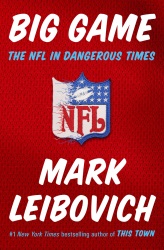 Mark Leibovich is The New York Times Magazine’s chief national correspondent. I am not a regular reader of his column, but I read his previous book, This Town, which I described as the author wallowing in the networking and social maneuverings.
Mark Leibovich is The New York Times Magazine’s chief national correspondent. I am not a regular reader of his column, but I read his previous book, This Town, which I described as the author wallowing in the networking and social maneuverings.He kids DC's political players about the unseemly side of their work but never condemns them. Leibovich paints an absurd picture and sort of shrugs it off. His easygoing prose makes a shrug seem like the natural reaction. This Town delivers the goods for political junkies—especially if you tracked national politics from 2007 to 2013. Hearing how embedded Washington correspondents are is discomfiting. But if disillusion has already set in, the disappointment in This Town lands softly.
I think the same is true of Big Game, a book about the National Football League (NFL). Leibovich rightly positions professional football as one of America's biggest cultural forces. And he attached himself to the league at a seemingly pivotal time. In 2017, the NFL was more successful than ever, but scandals, such as players protesting during the national anthem and the escalating reality that concussions are destroying players brains in real time, were threatening that success.
Leibovich does not deny the issues that cause the league's front office anxiety. But he overplays the attention-grabbing distractions, like Deflategate and the eccentricities of the billionaire team-owner class. Leibovich never really reckons with the larger, more serious issues.
I found the book very entertaining. But I never felt like the league and the owners were being confronted with a game-changing sequence of events. I agree with Joe Nocera's assessment in The Washington Post. Nocera says Leibovich "has a book-reporting strategy that consists of attending events (Tim Russert’s funeral; an NFL owners meeting), hanging around the periphery and writing what he sees, with plenty of snark and personal asides for good measure. He’s a good enough writer to keep you from wanting to throw the book against the nearest wall. But if you look closely, you’ll realize he has nothing to say."
Notes:
- My favorite part was definitely Leibovich getting drunk on Jerry Jones's bus.
One of the drivers in Jerry's employ, an African American gentleman named Emory, opened a back cabinet stocked with $250 bottles of "Blue." No doubt Jones could afford the smooth booze, but he also mentioned a qualifier. "It's the stuff it makes you do after you've had it that you might not be able to afford," he said. I relay this by way of transparency into Jones inhibitions, which after a few more supersized pours from Emory were weakening fast.
Leibovich asks Jones which means more: the Hall of Fame jacket or another Super Bowl ring. Jones, drunk, finally admits the jacket is more important to him.
- "Are these the last days of the NFL?" by Joe Nocera, The Washington Post, 13 September 2018